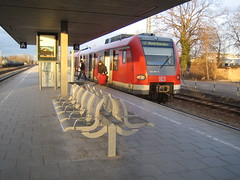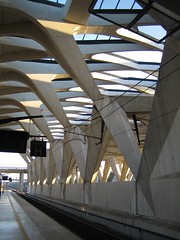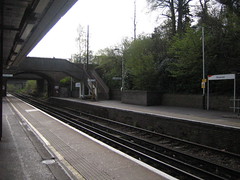One of these days, Ottawa will get a rail backbone. Hopefully it will happen sooner, rather than later or never.

Having to travel as much as I do for work is a mixed blessing. While it does give me the opportunity to see breadth of places few people do, it can be exhausting and although I'm on location, I don't often get to really see what there is to see. This ain't no vacation!
That would be one of the bigger reasons why I take the train at every opportunity. After passing through the bowels of airport security, after hours spent waiting for flights and connections, after six to eight to fourteen hours falling perpetually into the horizon upon the last gasps of a petroleum-powered buzzard...
I relish the thought of not having to immediately place myself behind the wheel of an unfamiliar thunder-lizard upon foreign roads and get myself from airport to bed in a reasonable length of time.

I can sit back and let my travel-addled mind relax and absorb my new surroundings.
It's unfortunate that most of North America has allowed rail transit to become either luxury retreat or subterranean zombie factory. Put the rails above ground, where passengers take in the passing landscape and pedestrians can peruse in peace. Bury the cars underground so all those antisocial grumps and emergency vehicles aren't suffered the distractions of natural life. If you're driving a vehicle then you should be paying attention to the road, not the scenery, right?
Just think about it for a moment. When driving a personal car, your first point of business is to get from point A to point B safely. If the inner-city roads were underground then the only distractions would be the vehicles in front, those behind, and clearly marked exits and entrances, a.k.a. street signs. All those pedestrians and bicycles that would normally be getting in the way, wouldn't.
For businesses above-ground, foot-traffic would increase by all definitions. Daily rail commuters would see it all. Unlike bus-bound commuting, rail schedules are a great deal more predictable and dependable, making any impromptu trip even more convenient than by car - no traffic or parking dependencies to worry about.

For the intercontinental traveler like myself, not being able to read the signs or speak the language is only a minor inconvenience where substantially developed rail infrastructure exists. All the players have websites detailing routes and schedules, making pre-travel preparation trivial. Find the right train, get on the right direction, get off at the right destination. That's all there is to it. If you get off at the wrong stop, it isn't usually too long a wait until the next train or the one headed in the opposite direction comes along. Worst-case, cell phones work so calling on virtual assistance is easy - assuming you remember to check into coverage before you leave.
